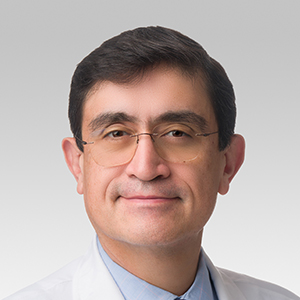Organ Transplants: What Makes a Good Donor
A Surgeon Shares the Facts
Published July 2021
More than 100,000 people are on the national organ transplant waiting list, and 17 people die every day waiting for an organ that never came.
“There is a big gap between demand and supply of organs,” says Juan C. Caicedo, MD, a transplant surgeon and director of the Northwestern Medicine Hispanic Transplant Program. “There is a huge need, and there are very few organs available.”
You can give life to so many people when you donate.— Juan Carlos Caicedo, MD
Organ donation is vital for a healthy population: A single donor can save up to eight lives and enhance more than 75 others, according to the Health Services and Resources Administration. However, while 90% of adults in the U.S. support organ donation, only 60% are actually signed up to be donors.
How Organ Donation Works
Organ donation can come from either a living or a deceased donor. Anyone can be a donor, Dr. Caicedo says. But living donors, which are most common for kidney and liver transplants, need to be adults so that they can make informed and independent decisions about their donation.
For deceased donors, the process begins with registering. The United Network for Organ Sharing (UNOS), which is the private, non-profit organization that manages the nation’s organ transplant system under contract with the federal government, states that people most frequently become donors after a stroke, heart attack or severe head injury. Registration does not expire, so even if death occurs decades after registration has been completed, organ donation may be possible.
Additionally, it is important to note that not every donation goes toward transplantation. Donors (or their family, if the donor isn’t registered) can authorize their organs and tissues to be used for medical research and education. Non-transplantable organs and tissues can help scientists understand disease processes and find new ways to treat disease.
Characteristics of a Good Organ Donor
Regardless if someone is a living or deceased donor, numerous factors affect the potential match of the donor and the recipient. But in general, donors should be, or have been, physically and mentally healthy.
“A good donor or a match depends on the type of transplant,” Dr. Caicedo says. “And compatibility isn’t necessarily the biggest issue; it’s that you are willing to do it and that you’re healthy.”
If you are wondering if you might be a good living donor, start by consulting your physician. “It’s our job to help people figure out if they can donate or not,” Dr. Caicedo says. “We have to do a very thorough evaluation of the donor to make sure that we can proceed.”
The Importance of Donor Diversity
While shared ethnicity is not a requirement for organ donors and recipients to match, a more diverse donor registry gives more people on the transplant waiting list a better chance to find a good match. The immune system markers used to match organ recipients and their donors are inherited, so people with rare markers are more likely to match someone from a similar ethnic background.
According to Donate Life America, a nonprofit that aims to increase the number of donated organs and tissues available through transplantation, those who are African American/Black, Asian/Pacific Islander, Hispanic/Latino, American Indian/Alaska Native and multiracial descent currently make up nearly 58% of individuals on the national organ transplant waiting list.
“Minorities are the majority on the waiting list,” Dr. Caicedo says. “And, for example, non-Hispanic white people are receiving more of the kidneys despite being fewer of the numbers on the list.”
How to Become a Donor
You can register to be a donor through the United States Health Resources and Services Administration.
As of mid-2021, more than 165 million people have registered as organ donors, but only about three in 1,000 people die under circumstances that allow for organ donation, so the need continues to be urgent.
“You can give life to so many people when you donate organs or you donate tissues,” Dr. Caicedo says. “But people need to be better informed about the process.”






